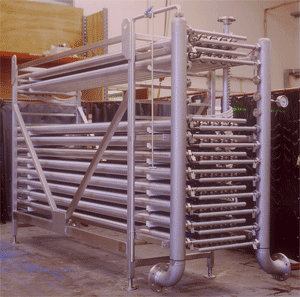Membrane filtration technology is a key component in a new system recently installed to help kiwi juice producers make a higher quality concentrate. The reverse osmosis system also reduces energy consumption by cutting the processing temperature and limiting the time required for evaporation.
Kiwi juice producers in Jiado Quimei, Xian Province, China, were using conventional evaporation to concentrate their juice, but the high temperatures required by evaporation caused the concentrate to turn from green to brown. During the reconstitution process, artificial coloring could be added to restore the juice to a more natural looking green, but this lowers the market value of the juice concentrate. Producers were looking for a system that would allow them to process the juice at lower temperatures between 95 and 122° F (35 and 50º C) to eliminate damage to both the color and taste of the juice caused by heat degradation.
Alberto Bertuzzi, SpA, the specialist Italian food-processing company, proposed using a membrane filtration system as a way to solve the heat degradation problem and raise the market value of the end product. The high level of suspended matter in kiwi juice was a critical issue, and potential energy savings played an important role in the decision to use membrane technology in the plant. Bertuzzi selected B1 modular membrane technology as the core component in a custom membrane filtration system that would meet the needs of the juice producers. This reverse-osmosis filtration system, which has a feed capacity of up to 1321 gallons (5000 liters) per hour, depending on the final product specification, was built as a special process line in an existing plant. PCI Membrane Systems, now represented in the Americas by Membrane Specialists LLC, provided a short customer process trial and technical and engineering advice to aid in the development of the line.
At optimum cross-flow velocities through the membranes, juice can be concentrated to 20/22º Brix. Thus, a much shorter evaporative stage is required to achieve ultimate concentration. This lowers the energy requirements 50% compared to the traditional evaporative process and exposes the juice to heat for shorter periods of time.
Choosing the right membranes for use in the system was critical to the success of the project, and there were many considerations involved in the selection. This membrane package had to achieve optimum retention rates of up to 99%. In addition, the package had to be capable of giving a good flux at lower temperatures while, at the same time, it had to be able to stand up to cleaning with aggressive alkaline chemicals and high-temperature water sensitization. The AFC99 membrane package f met all of Bertuzzi’s requirements.
The B1 filtration modules that make up the system are constructed almost entirely of stainless steel (see photo). In addition, the B1 module’s large diameter channels minimize the potential for blockage, so that there is no need for extensive pre-filtration.
Reverse-osmosis is the finest filtration process, removing particles at the smallest molecular level. The process uses a semi-permeable membrane that retains almost all dissolved species including low-molecular-weight organics, sugars and salts. This allows the fluid being concentrated to move through the membrane while rejecting the suspended matter. The cross-flow configuration allows the membranes to clean themselves continually. As the concentration of the fluid being rejected increases, pumps generate the driving force required to continue the concentration process.
The B1 membrane filtration modules are ideal for applications across the food and beverage industry where the cost-effective concentration of fluids and high product quality are required.
Membrane Specialists LLC takes an unbiased approach to crossflow membrane selection, ensuring truly independent solution, ideal for each application. Membrane Specialists offers the full range of membrane geometries, incuding spiral wound, hollow fiber and both ceramic and polymeric tubular membranes. This choice of configurations makes it possible to test across the entire filtration spectrum from reverse osmosis, through nanofiltration and ultrafiltration to microfiltration. Trials can be carried out in Membrane Specialists laboratories or at your site, with or without assistance.

Reverse osmosis membranes are housed in filtration modules constructed almost entirely of stainless steel. Large diameter channels minimize the potential for blockage, so that there is no need for extensive pre-filtration.
